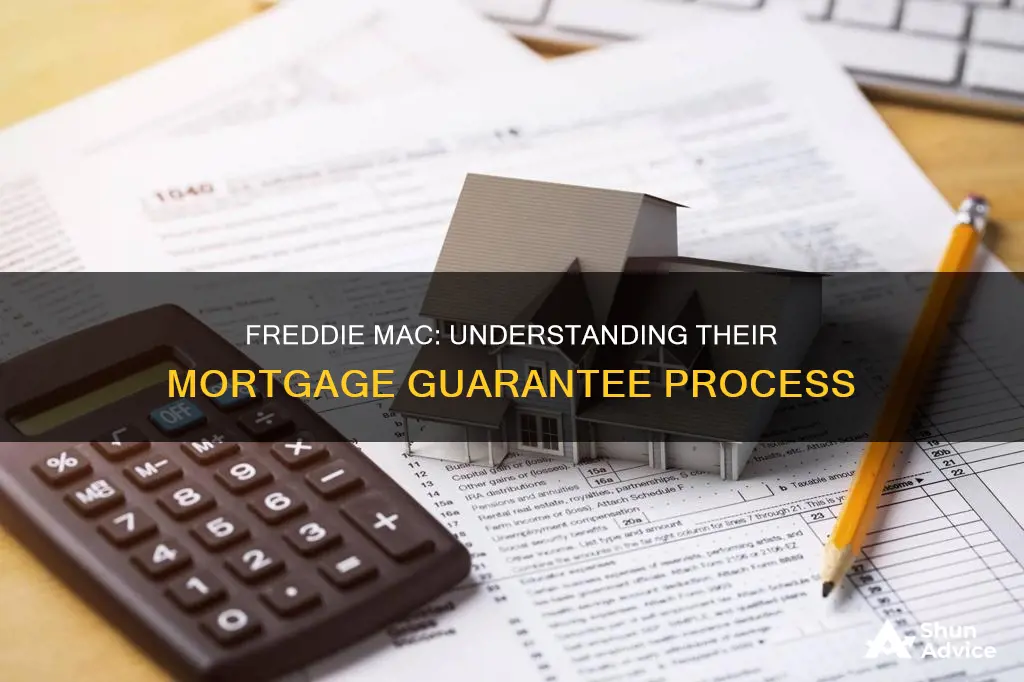
Freddie Mac is a government-sponsored enterprise that provides liquidity, stability, and affordability to the mortgage market. It purchases a variety of fixed-rate mortgages, including 15-, 20-, and 30-year options, and securitizes them into mortgage-backed security (MBS) bonds. Freddie Mac makes money by charging a guarantee fee on these loans, which investors are willing to pay in exchange for assuming the credit risk. This guarantee ensures that the principal and interest on the underlying loan will be paid back, making these MBSs particularly attractive to investors. Ultimately, Freddie Mac's role in the secondary mortgage market helps to ensure a steady flow of mortgage credit, influencing interest rates and availability.
| Characteristics | Values |
|---|---|
| Primary method of making money | Charging a guarantee fee on loans that it has purchased and securitized into mortgage-backed security (MBS) bonds |
| Freddie Mac's requirements | Designed so that the mortgages purchased are originated, underwritten and serviced to help qualified borrowers buy homes they can both afford and maintain |
| Guarantee | That the principal and interest on the underlying loan will be paid back regardless of whether the borrower actually repays |
| Ranked | No.45 on the 2023 Fortune 500 list of the largest United States corporations by total revenue |
| Assets under management | $3.208 trillion |
| Conforming loan limit | Set annually by FHFA in response to the October-to-October change in mean home price |
| Conforming loan limit in high-cost areas | 50% higher |
| Loans guaranteed by Freddie Mac | Known as conventional loans |
| Liquidity and stability | Provided to the rental housing market, improving access to quality, affordable housing |
What You'll Learn

Freddie Mac's guarantee fee
Freddie Mac is a government-sponsored enterprise that provides liquidity, stability, and affordability to the mortgage market. It primarily makes money by charging a guarantee fee on loans that it has purchased and securitized into mortgage-backed security (MBS) bonds. Investors are willing to let Freddie Mac keep this fee in exchange for assuming the credit risk. That is, Freddie Mac guarantees that the principal and interest on the underlying loan will be paid back regardless of whether the borrower repays. These guarantees make MBS a relatively safe investment with a credit rating close to that of US Treasuries.
The Federal Housing Finance Agency (FHFA) is responsible for setting the guarantee fees charged by Freddie Mac and is required by the Housing and Economic Recovery Act of 2008 (HERA) to conduct an ongoing study of these fees and submit annual reports to Congress. Over the years, the FHFA has directed Freddie Mac to make several changes to its guarantee fees, including increasing fees on single-family mortgages and making fees more uniform across lenders.
It's worth noting that Freddie Mac's guarantee fee does not imply any guarantee or obligation from the US government. While Freddie Mac has a close relationship with the federal government, its securities are not funded or protected by the US government.
FHA Mortgages: Government Influence and Impact Explored
You may want to see also

The role of the FHFA
The Federal Housing Finance Agency (FHFA) was established in July 2008 by the Housing and Economic Recovery Act. It placed Fannie Mae and Freddie Mac into conservatorship, effectively bringing them under government control. The FHFA has overseen the two firms since then, with regulatory oversight and an implicit guarantee.
The FHFA plays a critical role in the nation's housing finance system by providing liquidity, stability, and affordability to the mortgage market. It achieves this by setting the annual limit for the size of a conforming loan, which is calculated based on the October-to-October change in mean home prices. The FHFA ensures that the Enterprises, i.e., Fannie Mae and Freddie Mac, have access to lower borrowing costs, enhancing investor confidence.
The Enterprises buy mortgages from lenders and either hold them in their portfolios or package them into mortgage-backed securities (MBS). They guarantee the timely repayment of the principal and interest on the underlying mortgages, making MBS a safe and attractive investment. This guarantee assumes the credit risk, ensuring that investors are willing to take on the risk of the underlying loan.
The FHFA's role also includes overseeing the financial health of the Enterprises. During the pandemic, the FHFA implemented measures to support homeowners and renters, impacting the Enterprises' financial health. Additionally, the FHFA has the power to overhaul the boards of the Enterprises, as demonstrated in 2025 by the newly appointed director, Bill Pulte.
Removing the Deceased's Name from a Mortgage
You may want to see also

Conforming loans
Freddie Mac is a government-sponsored enterprise that provides liquidity, stability, and affordability to the mortgage market. It is ranked 45th on the 2023 Fortune 500 list of the largest US corporations by total revenue and has $3.208 trillion in assets under management.
Freddie Mac's primary method of making money is by charging a guarantee fee on loans that it has purchased and securitized into mortgage-backed security (MBS) bonds. Investors are willing to let Freddie Mac keep this fee in exchange for assuming the credit risk. Freddie Mac guarantees that the principal and interest on the underlying loan will be paid back regardless of whether the borrower repays. These guarantees make Freddie Mac MBS attractive to investors.
Freddie Mac also offers super-conforming mortgages, which are mortgages originated using higher maximum loan limits permitted for properties located in high-cost areas. These higher loan limits are intended to provide lenders with liquidity in these high-cost areas while also lowering mortgage financing costs for borrowers in these areas.
Deposits and Proof: Getting Your Mortgage Application Approved
You may want to see also

The impact of the 2008 financial crisis
Freddie Mac is a government-sponsored enterprise that provides liquidity, stability, and affordability to the mortgage market. It makes money by charging a guarantee fee on loans that it has purchased and securitized into mortgage-backed security (MBS) bonds. Investors are willing to let Freddie Mac keep this fee in exchange for assuming the credit risk. That is, Freddie Mac guarantees that the principal and interest on the underlying loan will be paid back regardless of whether the borrower repays.
Freddie Mac, along with Fannie Mae, played a significant role during the 2008 financial crisis. In the years leading up to the crisis, both enterprises started investing in riskier loans, contributing to a housing bubble. They purchased large volumes of Alt-A mortgages, which often lacked full documentation of borrowers' incomes. They also bought private-label MBS collateralized by subprime mortgages, i.e., loans issued to borrowers with poor credit ratings.
When home values collapsed in 2007, defaults surged, and the MBS market unraveled. As a result, Fannie Mae and Freddie Mac lost billions of dollars on their portfolios and MBS guarantees, and investor confidence in them eroded. Their stock prices plummeted, and insolvency loomed. In July 2008, Congress passed the Housing and Economic Recovery Act, establishing the Federal Housing Finance Agency (FHFA). In September 2008, the US government intervened to prevent the collapse of both corporations, placing them under direct government supervision and conservatorship.
Deed of Trust vs Mortgage: What's the Difference?
You may want to see also

Freddie Mac's mortgage products
Freddie Mac is a government-sponsored enterprise that provides liquidity, stability, and affordability to the mortgage market. It is ranked 45th on the 2023 Fortune 500 list of the largest US corporations by total revenue, with $3.208 trillion in assets under management. Freddie Mac's primary method of making money is by charging a guarantee fee on the mortgage-backed security (MBS) bonds it purchases and securitizes.
Freddie Mac offers a range of mortgage products to meet the diverse needs of borrowers. Here is a detailed overview of some of Freddie Mac's mortgage products:
Single-Family Mortgages
Freddie Mac's Single-Family Division purchases mortgage loans from lenders, enabling them to provide financing options to qualified borrowers. They offer fixed-rate mortgages with terms ranging from 15 to 30 years, providing stability and predictability for borrowers. These mortgages are typically used for 1- to 4-unit primary residences, including condominiums, second homes, and investment properties.
Renovation Mortgages
Renovation Mortgages provide borrowers with flexible financing options to repair, restore, or renovate their existing site-built homes. Borrowers can combine these mortgages with other Freddie Mac products, such as low down payment mortgages, to meet their specific needs.
Home Possible® Mortgage
The Home Possible® mortgage is designed for very low- to moderate-income borrowers, helping them achieve the dream of homeownership. It offers a down payment requirement as low as 3%, competitive pricing, and flexible credit options, making it easier for more borrowers to qualify.
Section 184 Native American Mortgages
Freddie Mac offers Section 184 Native American Mortgages guaranteed by the Department of Housing and Urban Development (HUD). These mortgages are available for Native American, Alaskan Native, and New Mexican Pueblo homebuyers. They can be used for 1- to 4-unit primary residences, including owner-occupied or leasehold estates on fee simple and restricted lands.
Financed Permanent Buydown Mortgage
The Financed Permanent Buydown Mortgage helps borrowers reduce their monthly payments without requiring additional cash at closing. This product is ideal for those seeking to lower their interest rates and overall payment obligations.
Mortgage Broker Money-Makers: Their Methods and Motivations
You may want to see also
Frequently asked questions
Freddie Mac is a large company that guarantees most of the mortgages made in the U.S. It is a government-sponsored enterprise that provides liquidity, stability, and affordability to the mortgage market.
Freddie Mac purchases mortgage loans from lenders and securitizes them into mortgage-backed security (MBS) bonds. It then charges a guarantee fee on these loans, which investors are willing to pay in exchange for Freddie Mac assuming the credit risk. This means that Freddie Mac guarantees that the principal and interest on the underlying loan will be paid back, regardless of whether the borrower repays it.
Freddie Mac offers a range of mortgage products, including fixed-rate mortgages for single-family homes, renovation mortgages, and low down payment mortgages. It also provides financing options for underserved markets through loans guaranteed by the USDA’s Rural Housing Service (RHS) and offers Section 184 Native American Mortgages guaranteed by HUD.
Freddie Mac-guaranteed mortgages reduce risk for lenders and investors, making loans more affordable and accessible. They also contribute to the availability of 30-year fixed-rate loans and provide flexibility and credit flexibilities to help low- to moderate-income borrowers achieve homeownership.
You can use the resources on the Freddie Mac website to find out if Freddie Mac owns your loan or financed your apartment building. These resources can also help you understand your options when buying, owning, or renting a home.







